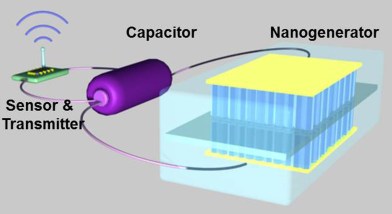Scientists have developed a self-powered nano-equipment with the ability to transfer data across long distances wirelessly.
 Scientists are reporting development of the first self powered nano-device that can transmit data wirelessly over long distances
Scientists are reporting development of the first self powered nano-device that can transmit data wirelessly over long distances
In a study published in Nano Letters, a journal of ACS, scientists say that the invention of the self-powered nano-equipment will prove useful for the development of an innovative range of stationary and airborne surveillance cameras and sensors, minute implantable medical sensors, wearable electronics, and other equipment that function independent of batteries and consume energy available in the surroundings.
Zhong Lin Wang and coworkers mentioned that the advancement in electronics has paved the way for the development of minute equipment that function without batteries. They explained that these minute equipment use negligible amounts of electricity that can be generated from a gentle breeze, the pulse of a blood vessel, or the movements of an individual walking. The scientists explained that the equipment can operate using the energy harvested from naturally-occurring sources including vibration, gentle airflow, solar, sonic wave, thermal and/or chemical energy.
The equipment comprises a nanogenerator that generates power from mechanical vibration. It also includes a capacitor for storing the energy and electronics that feature a radio transmitter and a sensor as used in Bluetooth mobile phone headsets. The wireless signals transmitted by the equipment could be sensed by a radio at distances over 30 feet.